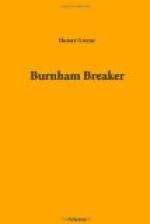“Wait a bit! Keep up your courage, Ralph. Ye’ve done a braw thing, an’ ye’re through the worst o’ it; but ye’ll find a hard path yet, an’ ye’ll need a stout hert. Ralph,” he had taken both the boy’s hands into his again, and was looking tenderly into his haggard face and bloodshot eyes; the traces of the struggle were so very plain—“Ralph, I fear I’d cry ower ye a bit an we had the time, ye’ve sufferit so. An’ it’s gude for ye, I’m thinkin’, that ye mus’ go quick. I’d make ye weak, an’ ye need to be strang. I canna fear for ye, laddie; ye ken the right an’ ye’ll do it. Good-by till ye; it’ll not be lang till I s’all go to ye; good-by!”
He bent down and kissed the boy’s forehead and turned him to face toward the city; and when Ralph had disappeared below the brow of the hill, the rough-handed, warm-hearted toiler of the breaker’s head wiped the tears from his face, and climbed back up the steep steps, and the long walks of cleated plank, to engage in his accustomed task.
There was no shrinking on Ralph’s part now. He was on fire with the determination to do the duty that lay so plainly in his sight. He did not stop to argue with himself, he scarcely saw a person or a thing along his path; he never rested from his rapid journey till he reached the door of Mrs. Burnham’s house.
A servant came in answer to his ring at the bell, and gave him pleasant greeting. She said that Mrs. Burnham had gone to Wilkesbarre, that she had started an hour before, that she had said she would come back in the early evening and would doubtless bring her son with her.
Ralph looked up into the woman’s face, and his eyes grew dim.
“Thank you,” he said, repressing a sob, and he went down the steps with a choking in his throat and a pain at his heart.
He turned at the gate, and looked back through the half-opened door into the rich shadows that lay beyond it, with a ray of crimson light from the stained glass window cleaving them across, and then his eyes were blinded with tears, and he could see no more. The gates of his Eden were closed behind him; he felt that he should never enter them again.
But this was no time for sorrow and regret.
He wiped the tears from his eyes and turned his face resolutely toward the heart of the city.
At the railroad station he was told that the next train would leave for Wilkesbarre at twelve o’clock.
It lacked half an hour of that time now. There was nothing to do but to wait. He began to mark out in his mind the course he should pursue on reaching Wilkesbarre. He thought he would inquire the way to Mr. Goodlaw’s office, and go directly to it and tell the whole story to him. Perhaps Mrs. Burnham would be there too, that would be better yet, more painful but better. Then he should follow their advice as to the course to be pursued. It was more than likely that they would want him to testify as a witness. That would be strange, too, that he should give such evidence voluntarily as would deprive him of a beautiful home, of a loving mother, and of an honored name. But he was ready to do it; he was ready to do anything now that seemed right and best, anything that would meet the approval of his Uncle Billy and of his own conscience.




